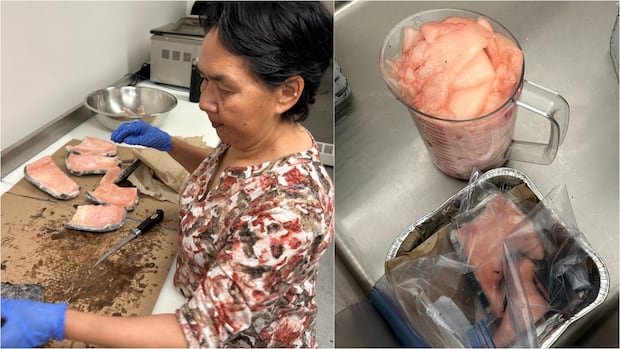In Iqaluit, Ainia Nooshoota is seen preparing narwhal meat at the Qinnirvik Country Food and Bulk Store. The narwhal meat, a rare delicacy caught by hunters 750 kilometers away in northern Nunavut, is not always readily available in the area. Nooshoota, the store manager, mentioned that she usually consumes beluga meat but finds narwhal meat chewy with a subtle taste that she enjoys.
Narwhal meat, known for its light flavor and tough texture, is commonly consumed raw but can also be cooked in seasoned dishes such as stews or soups. Maktaaq, which consists of skin and blubber chunks, is considered a delicacy. The store in Iqaluit offers a variety of country food items, including caribou, seal, and Arctic char, sourced from the local land, air, and water. This traditional food is crucial not only for addressing food insecurity in Canada’s North but also for preserving Inuit culture.
Joseph Murdoch-Flowers, the executive director of the Qajuqturvik Community Food Centre, emphasized the significance of hunting in Inuit life. He stated that consuming country food helps individuals feel more connected to Inuit culture, promoting a sense of sovereignty. The food center collaborates with hunters and fishers to provide seasonal catches, which are sold on a sliding scale at the store. Additionally, the center offers free daily meals and food boxes while being funded through various sources, including government funding and donations.
Statistics Canada reported that 63% of households in Nunavut experienced food insecurity in 2022, significantly higher than the southern provinces’ rate of 23%. High grocery prices in the North, exacerbated by the COVID-19 pandemic, contribute to this disparity. Murdoch-Flowers highlighted the positive impact of the hunting initiative in supporting both struggling individuals and hunters, fostering community connections, and passing down traditional knowledge to younger generations.
The article also discussed the importance of sustainable hunting practices, respecting the animals, and sharing resources within the community. Johnny and Sheila Flaherty, a couple engaged in hunting and harvesting activities, expressed their dedication to preserving their cultural practices and instilling these values in future generations. Sheila emphasized the value of maintaining traditional practices, while Johnny stressed the importance of not overkilling, respecting the animals, and sharing resources among community members.
Food insecurity affects everyone in Iqaluit, regardless of their economic status, emphasizing the need for community support. The Qajuqturvik Community Food Centre plays a crucial role in addressing this issue by providing free meals and essential food items to residents. The center’s efforts underscore the significance of community collaboration and cultural preservation in combating food insecurity in the region.


